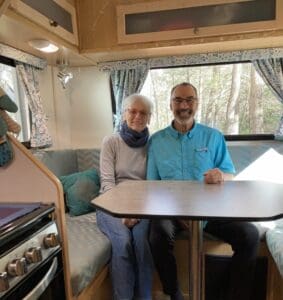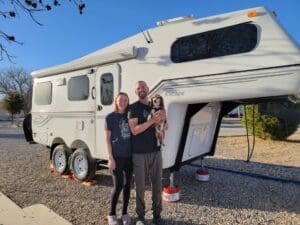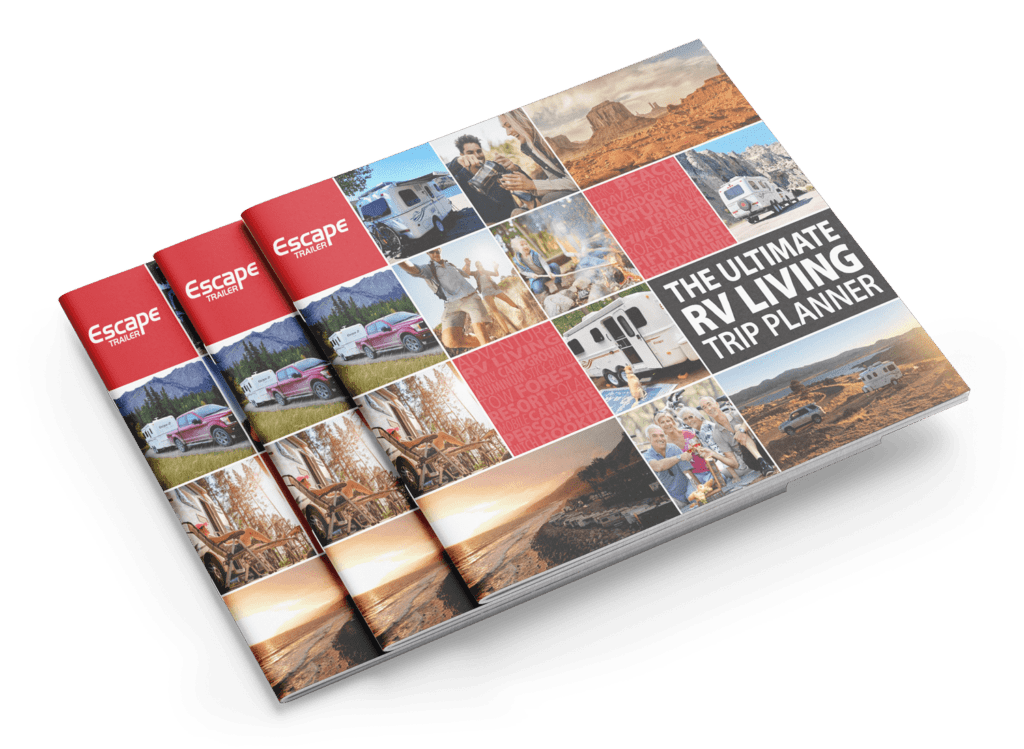15 Fuel Efficiency Tips & Tricks for RVers
As gas prices soar, you might have second thoughts about RVing. However, you can easily minimize your fuel costs with some planning and minor changes to your routine. Some fuel-savings techniques will give you a big bang for your buck while others have a small but cumulative effect. As you set out on the road, prepare to save on gas and remember that saving money by saving fuel provides you with more funds while on the road for more unforgettable adventures.
To make your journey more fuel-efficient, we’ve come up with the top 15 ways RVers like you can reduce fuel costs while on the road.
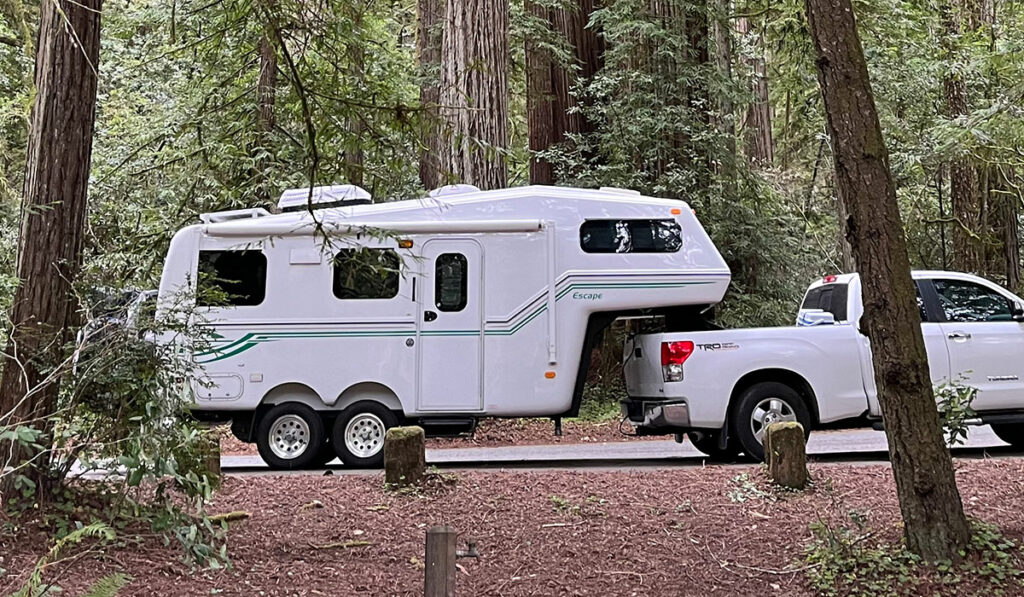
How to save money on your fuel bill & improve your fuel efficiency
To make the most of your fuel budget, we’ve gathered the best ways to improve your gas mileage and save money on the fuel you purchase.
1. Purchase your gas from a membership club
Membership clubs like Costco, BJs, and Sams sell gas at a reduced price. As an avid RVer, you can easily save enough money on your gas to pay for the annual membership plus some. However, you have to plan a little more to make sure that you are near a club when you need to fill up.
2. Pick travel destinations closer to home
As you plan your upcoming trips, look for places closer to home. Less driving means less gas as well as more money to spend on other things. If you look carefully, you can find many fun and unusual attractions that are closer to where you live. If they are closer, you can spend more time enjoying your location and less getting to and from.
3. Avoid unnecessary side trips & detours
With a bit of planning, you can avoid excess stops that can drain your fuel tank. If you need groceries, use a grocery list and careful meal planning to shop for several days at a time. You can also put some things off, as well. Ask yourself before heading to the store, “do you really need to run to the store for that half-gallon of ice cream?” Combining and eliminating trips can reduce the miles that you drive.
4. Fill up Monday through Thursday
While not always true, most places raise gas prices for the weekend. If you can, fill your tank up during the week. The difference might only be a few cents per gallon, but over the course of a trip or two, that can really add up.
5. Stay longer at each location
If you are staying at two locations instead of four, you will be driving less and saving on gas. Not only that, but there will be less packing and unpacking, loading and unloading.
Giving yourself more time at a locale allows you to fully embrace the area and all the activities it has to offer. Consider hiking the same trail twice–you will likely be surprised what different times of day bring about a different variety of wildlife and scenes. If you’re looking to get away but aren’t sure how many unique adventures one of your destinations has, pack a few things to keep you entertained, such as DVDs, books, or games. You can always use your spare time to get back in shape while on the road.
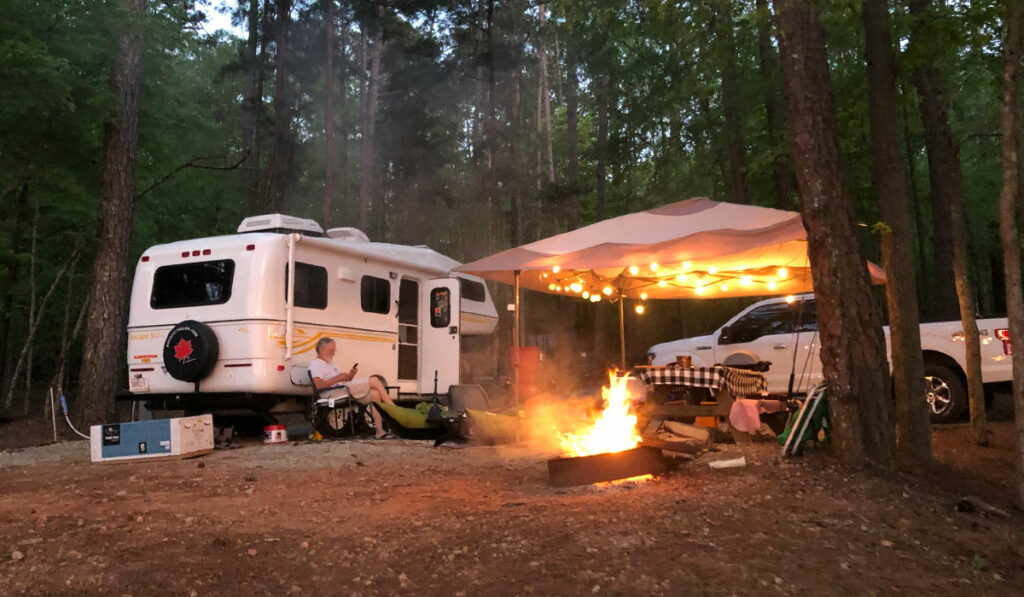
6. Drive a bit slower
Your gas mileage goes down as speed goes up. This is really noticeable when your speed gets up over 50 mph or 80 kph. RVs are not always the most aerodynamic vehicles on the road, so the difference can be very pronounced. Don’t drive so slow that you are a hazard, but don’t be the fastest vehicle on the road either.
7. Use your cruise control
Using your cruise control will help keep you at a constant speed. Accelerating and decelerating unnecessarily can eat up gas. So, turn on the cruise once you are up to speed, but stay alert so that you don’t back-end the vehicle in front of you if there is a stoppage in traffic.
8. Accelerate and brake mindfully
Jack rabbit-starts and skidding stops are hard on mileage and your vehicle. When you start, ease the gas pedal down and slowly accelerate to the speed you want.
When you drive, look further down the road better to anticipate red lights and slower traffic. You can ease off the gas instead of staying at your current speed. Coasting to slow down will save gas and will help your brakes to last longer. Slow starts and easy stops also make it more comfortable for your passengers.
9. Give your tow vehicle a tune-up
Give your motor a tune-up. A properly functioning engine will save you money in the long run. Have your sensors checked, as well. Make sure that your wheels are aligned and balanced. Both of these can reduce drag on the vehicle and increase mileage.
10. Lighten up–Pack less
Less weight means it is easier to accelerate and brake steadily with control. If you can, don’t fill your water tanks to the top. Fill them with as much water as you need to get you to your destination, then you can top off your tanks there. Empty gray water and waste whenever you can. Again, it will improve your mileage.
Packing less will also improve your mileage. As you prepare for your trip, ask yourself if you need each and every item that you load into your RV. One thing you can leave home is firewood. Just buy it when you get to your destination or collect it if the site allows.
11. Leave your tow vehicle at the campsite–bike instead
One easy way to lighten your fuel bill is to bring along a bike and use it to get you to the camp store or a nearby grocery store. Of course, this requires that you plan ahead and select campsites that have shops within biking distance.
12. Pick the best route
Smooth, level roads will improve your mileage noticeably. Picking a route with fewer starts and stops by avoiding urban areas. This will increase your gas mileage considerably. Starting and stopping constantly is a great way to burn gas, so plan to avoid busy roads, especially during rush hour.
13. Check tire pressure
Constantly check your tire pressure. Check it before you leave home, and check it every day while you are driving. Your tire pressure will change throughout your trip based on temperature and vehicle weight.
Lower tire pressure lowers your gas mileage. It can also make driving dangerous. When your tire pressure is off, your RV could pull to one side or the other, and most importantly, a soft tire can blow, causing an unneeded delay as you get it replaced at best or cause an accident at worst.
14. Lower wind resistance for smooth sailing on the road
Keep your tow vehicle and RV as aerodynamic as possible. This is especially impactful at higher speeds. Cover your AC and lower your antenna. Ask yourself what you have on the outside of your RV that could slow you down? Remove all that you can. It will improve mileage, and you might even see a reduction in outside noise as you drive.
15. Don’t idle and turn off your generator
The last thing that you can do is turn your vehicle off instead of sitting and letting the motor idle. If you run into a traffic jam, it might be a good time to stop for a bite to eat and a cup of coffee.
Turning your generator off while you’re not in your travel trailer can also save you money. For example, you don’t need to air-condition your RV while you’re spending the entire day on the river. You may even be able to turn it off overnight if the temperature drops to a comfortable level.
Save on gas. Go on more adventures.
Saving on gas isn’t always glamorous, but if you can save enough to spend an extra few days on the road, wouldn’t it be worth it? Most of these suggestions are easy to do and very well could make your trip safer. In the end, you will end up spending less on your vacation. Plus, you’re reducing your impact on the planet. Don’t forget that every gallon of gas adds three times its weight of carbon dioxide to the atmosphere. Saving gas is good for you and great for your planet.
To receive our newsletter by e-mail, please click the “Subscribe” button in the footer below.









